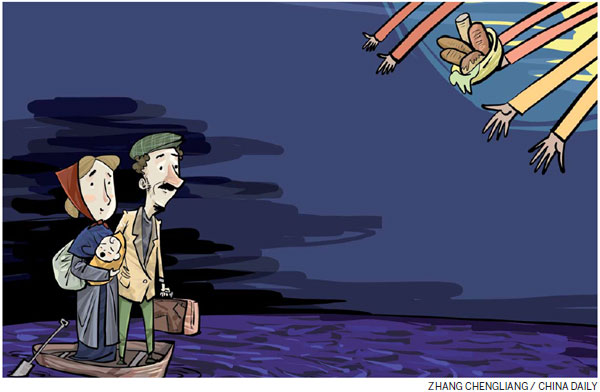Chinese people welcome dispossessed
Updated: 2016-06-10 08:32
By Giles Chance(China Daily Europe)
|
|||||||||
More than 45 percent replied 'yes' to the survey question: 'Would you personally accept refugees in your own home?'
Refugees have been with us for ever, but recently, the wars in the Middle East have made the refugee challenge an important political issue for many countries, particularly in Europe. Not since the end of World War II have so many people been displaced from the countries where they were born, forced by homelessness and war to seek refuge elsewhere, often traveling huge distances by sea and land, while lacking food and water.
In 2015, hundreds died every month in crossing the Mediterranean from North Africa to Italy, Albania or Greece. In the same year, more than 1.3 million claims for refugee asylum were made inside Europe, with applicants from Syria, Afghanistan and Iraq making up over half. For every 100,000 inhabitants, Hungary, Austria and Sweden took the most refugees, with Norway, Finland and Germany not far behind.

But the numbers of refugees granted permission to stay was much lower than the number who applied. Only 290,000 asylum applications were granted in 2015. The first response of most European governments to the human flood arriving from Syria in small inflatable boats on the beaches of Lesbos, the Greek island closest to Turkey, was shock and rejection. Emergency meetings between heads of state were hastily convened to work out ways to prevent Syrians from leaving their country, or at least to prevent the human tide from reaching the prosperous West.
In France, the popular reaction to Middle Eastern immigration is driving support for right-wing extremist politician Marie Le Pen. In the United Kingdom, immigration has become the most important factor in the referendum on June 23 on whether to leave the European Union. The UK's welfare system, which is generous to new arrivals, acts as a magnet for migrants from Africa and the Middle East. As the British try to stop the inflow of new arrivals, a huge camp of immigrants, many from Syria, has established itself on the French border with the English channel. Groups of men try every night to escape through the Channel Tunnel by train or truck, and some are killed in the attempt.
In Germany, which took more immigrants than any other country last year, Chancellor Angela Merkel's position, previously unassailable, is coming under threat from Germans who feel that their borders should be closed to the flood of starving, desperate humanity.

But since the beginning of 2016, it's become clear to many that the problem is not going to go away soon, as the flood of refugees continues. Many people have started to think more deeply about the problem, and what the correct response should be. In April, the pope visited Lesbos. When he left, the pope gave a signal to his millions of followers by taking 15 refugees back with him to Rome.
A recent survey conducted by Amnesty International (an independent nongovernmental organization) of 27,000 people in 27 countries shows that the global response to refugees is changing. Eighty percent of the people surveyed said that refugees should be accepted in their country, and 70 percent said that national governments should be doing more to help refugees. Ten percent said that they would accept a refugee as a guest in their home.
More than 80 percent of the people in China, Germany and the United Kingdom told the survey that refugees would be welcome. Respondents from Canada, Australia, Spain, Greece and Jordan were nearly as welcoming, while in Russia, less than 20 percent thought that refugees should be allowed into their country. More than 45 percent of Chinese (and less than 5 percent of Russians, Indonesians, Poles and South Koreans) replied "yes" to the question: "Would you personally accept refugees in your own home?" More than four out of five Chinese thought that their government should be doing more to help refugees who are running away from war or persecution.
The 27-country survey showed that Chinese people are more welcoming to refugees than any other surveyed country. Germany, the United Kingdom and Spain were runners-up, together with Greece, whose current economic difficulties apparently do not change its friendly approach to dispossessed people fleeing persecution and war.
On the other hand, Russia emerges as the country which is most hostile to refugees. The United States, a country created by immigrants, and whose president is the son of a Kenyan man and an American woman who was raised in Indonesia, did not show itself in the survey to be particularly friendly toward immigrants. The success of Donald Trump in gaining support in the ongoing presidential election in the US, by promising to build a wall to keep out Mexican immigrants, shows how hostile many Americans are to refugees, who they see as taking away their jobs. The Chinese, living in an ultra-competitive, fast-changing work environment, could make the same excuse, but they do not.
China stands out from the others as a country whose people want to accept refugees. Why should the people of some countries welcome refugees more than others? And why should the Chinese people welcome refugees more than any other people?
Some national cultural value systems emphasize hospitality and kindness. Confucius died thousands of years ago, when China consisted of many small states constantly fighting each other for survival. Yet his ideas continue to inspire Chinese people, sometimes without their realizing it. To be kind and generous is at the heart of the Confucian concept of the good man, who has integrity, honor and who does the right thing in each new situation he confronts. Many Chinese today lament the emergence of a society in China which worships materialism, and which has forgotten older Chinese values. Yet, this survey perhaps demonstrates that traditional Chinese values have not yet disappeared.
If Christianity were the key factor which promoted refugee acceptance amongst Western countries, then we might expect to find countries like France and Poland, two very Christian countries, scoring well in the survey. Yet neither do particularly well. Germany, Spain and the United Kingdom emerge much better. Is there some other cultural factor that promotes kindness and hospitality? Certainly, the British have always been a kind nation, welcoming millions of migrants into their relatively small country, to the point that if you visit London today and walk down Piccadilly, you will pass people from every country on Earth - possibly excepting someone from England!
It seems unlikely that Iraq and Syria, created 100 years ago by the colonial powers of France and Britain from the ruins of the Turkish empire, will survive. New borders, drawn along religious and tribal lines, will replace the old ones. The emergence of new regimes that are relatively stable will take years. Meanwhile, the mass movements of people from the region will continue, with many never returning to their places of birth. This reality makes acceptance of migrants by many countries into a necessity, bringing great economic and cultural benefits as the new arrivals, many from ancient, sophisticated civilizations, settle down in their new environments.
The Chinese people have shown the people of other countries that the best response to the migrant crisis is welcoming, not rejection, which can only result in death and more destruction.
The author is a visiting professor at Guanghua School of Management, Peking University. The views do not necessarily reflect those of China Daily.
Today's Top News
The can-do generation to the fore
Riding the wave
China lists first sovereign offshore RMB bond on LSE
British PM denounces Brexit's 'complete untruths'
47% of European businesses would expand in China
Xi urges Washington to boost trust
Council of Europe unveils security convention
Former PM warns of chaos in case of Brexit
Hot Topics
Lunar probe , China growth forecasts, Emission rules get tougher, China seen through 'colored lens', International board,
Editor's Picks

|

|

|

|

|

|







